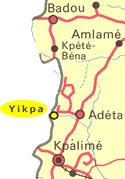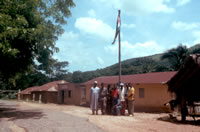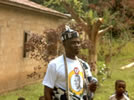The First Visit to Togo - Yikpa
In Adéta we turned off the Kpalimé road, following a lead about some waterfalls worth visiting on the other side of the mountains. We followed a narrow, paved road that soon began to wind in narrow serpentines up a steep, lush mountainside 300 meters (1000 feet) onto the plateau, which is between 700 and 900 meters (1400 - 2700 feet) high. The top of the plateau is noticeably cooler, and the rolling hills are covered in large plantations and small farms. Dense forests cover the steep mountainsides and narrow valleys. Although the forests are second-growth, we saw some amazing, huge tropical trees in these forests
 After
about 30 Minutes, the road took a hair-needle turn and dropped off into
a narrow valley, still steaming from the recent afternoon rain. The asphalt
started breaking up and in some turns, we had to circumnavigate huge potholes.
As we descended into the narrow valley, the trees became larger than any
we had seen anywhere, and the damp, dense forest swallowed us. We stopped
at one point, and got out. It was hot and steamy, the road was barely
wide enough for a small truck. Huge trees towered left and right over
the road and from inside the forest we heard the muffled noises of teeming
wildlife and the distant babbling of a creek.
After
about 30 Minutes, the road took a hair-needle turn and dropped off into
a narrow valley, still steaming from the recent afternoon rain. The asphalt
started breaking up and in some turns, we had to circumnavigate huge potholes.
As we descended into the narrow valley, the trees became larger than any
we had seen anywhere, and the damp, dense forest swallowed us. We stopped
at one point, and got out. It was hot and steamy, the road was barely
wide enough for a small truck. Huge trees towered left and right over
the road and from inside the forest we heard the muffled noises of teeming
wildlife and the distant babbling of a creek.
Yikpa is nestled in a narrow, lush valley
Finally, the road leveled and we crossed a bridge across a small river. We continued along the narrow, beat up blacktop at the bottom of the valley through two small villages with mostly tin-roofed, mud-brick houses. Some kids were waving at us, a couple of teenagers yelled at us: "Yovo! Cascade?" After about a mile we reached a third village, very similar to the first two, except for a small taxi station in the middle of the village and a large boom across the road at the end. A wet Togolese flag hung on a large pole and a small building next to the boom bore a big sign "Republique Togolaise." Apparently we had reached the border to Ghana at this remote border post.
We stopped and got out to inquire about the waterfalls. A couple of teenagers informed us it would only take about 250 FCFA for them to take us there. But it was too late in the day - the walk was actually a strenuous 2-3 hour hike across a mountain. So we turned around and made our way back driving slowly across the villages. On our way back, we discussed the potential for finding some interesting snakes in this valley. The vegetation was so lush and there was clearly a lot of wildlife in the forests As we left the first village, crossing the bridge before the road began climbing up the hill, Andy pulled over. We decided to get out and take a look around. We got out and almost tripped over several foot-high mud piles that had faces drawn on them, sticks for arms. A few feathers were scattered around these crude figures and some dark spots were visible on the light brown clay, probably from the blood of sacrificial chicken or goats. Those were the sacred fétishes, guarding the village.
We followed a path which lead past a small coffee field, to several dilapidated fish ponds. Andy got excited. This was great snake territory - the clearing of the coffee field with it's sunshine, the ponds with frogs and fish, the dense bush nearby. We poked around the ponds for a while, but we had no luck, snake wise. After a while a couple of young men appeared on the other side of a pond. They called us: "Monsieur! Oh - monsieur!" We replied "Ça vas?" They wanted to know what we were doing, and we replied, vaguely, that we were just checking out the "flora and fauna" in the neighborhood. They informed us that we were indeed trespassing on private property and that the chief of the village wanted to talk to us. Andy and I got a bit worried - this reminded us of the unpleasant experience with the village at the beach. We had no particular interest in getting into another tight spot like that. On the other hand, the kids seemed nice enough - at least they were not armed. Anyway, we had no real choice.
The village chief in these parts reigned over his fiefdom still with a good bit of the original absolute power of the old days. It used to be that his subjects would have to press their face in the dirt, if they encountered the chief of the village. No one had the right to look him in the eye. He had the last word over life and death of his villagers, and there were bloody feuds fought over the chiefdom in a village.Today, the power of the traditional chiefs is checked by the power of the state, but especially in remote places, that power is faint, and the old ways still prevail.
The view of Yikpa from the South, on the way to the cascade
So the young men led us across the street, through a heavy, wooden gate, into the compound of the chief's family. we entered a building with a large room with rows of chairs at the wall and we were asked to sit down. At one end of the room, stood a carved stool for the chief, next to a Togolese flag. When the chief entered through a door next to the stool, we all stood up, and he sat down on his stool. Each of the guys went up to the chief to greet him, bowing deeply while holding his hand and putting their left hand on their right fore-arm at the same time, while murmuring the various greetings in their language. The chief was relatively young, in his forties, tall and athletic with slightly grayed hair - a very handsome man with a good dose of charisma. Quite a different appearance from the grumpy, old chief we had encountered in the other village.
When it was our turn, Andy and I got up and shook his hand and greeted him politely: "Bon jour, monsieur," He replied simply: "Bon jour." Then he turned to one of the young men asking, in fluent French, what was going on. They explained that they saw us poking around the fishponds, and they wanted to make sure he was informed of our presence. Then the chief addressed us directly, explaining that in these parts it is custom that if you are a stranger in town, you go and introduce yourself to the town elders and the chief, and explain what your intentions are. So that was why the men decided to bring us to see him. I replied, and apologized for not coming to see him first. I explained that we had just come to find out more about the waterfalls and that we were also interested in seeing if there was any opportunity to catch some snakes. I assured him that we had no intentions of catching snakes without his permission, of course.
This prompted a some discussions among our hosts about potential whereabouts of snakes, and a lot more informal inquiries as to what the purpose of our interest in snakes was. Our explanation regarding the commercial value of snakes was met with a mixture of interest and disbelief, and prompted a lively discussion. After a while, a kid brought in a tray with shot glasses and a bottle of Gordon's Gin. The glasses were filled and passed around. We were informed that when strangers arrive in town, it is custom to also inform the ancestors and the relevant spirits. For that purpose, the chief was going to say a prayer, and we were all going to "drink to that" by pouring a swig of gin on the ground, and drinking the rest.
The chief proceeded to say his prayer, pour a swig of gin on the concrete floor of the room, down the rest of the gin, then spit a little spray of gin in front of him, and exclaimed: "DAFOOOH!" The others replied "YOOOH!" We followed his example, except for the spraying part ... After that, things got a lot more informal. Kids were sent to get beers, Andy and I were asked to tell our story, how we got there, where we were from, and so forth. After a couple of beers, and several prayers, the chief invited us to stay for dinner, and we ended up staying overnight in the chief's family compound.




